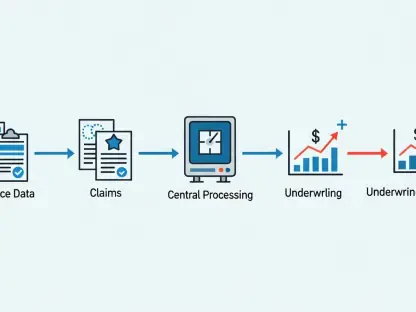The battle for data access in the financial sector is heating up, with fintech startups and traditional banks locked in a struggle that could redefine the competitive landscape of digital financial services. Fintech companies are pushing for greater access to consumer financial data to drive innovation in various areas such as digital banking and mobile payments. On the other hand, established banks are wary of potential threats from these emerging players and are hesitant to share valuable account information, thus setting the stage for a critical conflict in the finance industry.
Data Access and Innovation
Fintech firms thrive on access to financial data, which empowers them to offer novel services like digital banking, mobile payments, peer-to-peer lending, and investment platforms. Without this data, their ability to compete and evolve is significantly hampered, resulting in a restricted scope for innovation. Essentially, the control and flow of financial data can make or break fintech companies, as it is the lifeblood that fuels their technological advancements and service offerings. However, traditional banks, seeing the rise of these fintech firms as a direct threat to their longstanding hold on the finance market, often resist sharing this critical information.
This reluctance stems from a desire to protect their own business models and prevent the erosion of their market share. The controlled access to financial data by banks not only hampers the growth of fintech firms but also stifles broader innovation in the industry. Fintech companies, therefore, argue that without open data access, consumers are deprived of the benefits that new financial products and services could bring. They believe that open data sharing frameworks can lead to more tailored financial solutions, increased competition, and improved financial inclusion.
Regulatory Divergence
The regulatory landscape regarding data access in the financial sector is evolving differently across continents, reflecting divergent approaches to fostering innovation while maintaining financial stability. In Europe, the Financial Data Access Regulation (FIDA) seeks to establish a standardized, interoperable framework for a wide range of financial data. This broad-spectrum regulation is designed to empower consumers by giving them control over their financial data, fostering a competitive environment that encourages new entrants and innovation. By leveling the playing field, FIDA aims to dismantle the barriers erected by traditional banks, thus spurring competition and enabling fintech companies to thrive.
In contrast, the United States has taken a market-led approach through Section 1033 of the Dodd-Frank Act. This regulation focuses on establishing consumer rights to access their financial data without mandating specific technical standards or creating central infrastructures. This reflects a regulatory culture that favors incremental changes and traditionally supports incumbent players, including not only established banks but also Big Tech firms venturing into financial services. The approach in the US is less prescriptive, allowing market dynamics to dictate the pace and direction of innovation. This method aims to balance consumer rights with a more cautious regulatory approach that minimizes disruption for existing financial institutions.
Competitive Landscape
Despite the different regulatory strategies employed by Europe and the United States, both regions share the underlying goal of broadening data access to stimulate competition and drive innovation. The fintech ecosystem in the US is the largest globally, with approximately 13,100 fintech companies as of 2024. This thriving sector benefits from a generally supportive regulatory environment that provides ample opportunity for innovation and growth. In Europe, the fintech ecosystem has also seen significant growth, with around 9,200 fintech companies, marking a notable increase that has more than doubled since 2016. While the regulatory landscapes in these regions are distinct, the push towards greater data access is a common driving force behind the growth and innovation observed.
The competitive dynamics in these markets underscore the pivotal role that regulatory frameworks play in shaping the trajectory of the fintech industry. European regulations, with their focus on creating a level playing field, aim to dismantle the entrenched advantages of traditional banks. This approach nurtures a more dynamic and competitive environment, potentially leading to a surge in innovative financial products and services. In contrast, the US methodology allows for a more organic evolution, where market forces and incumbent players influence the expansion of data access. These differing regulatory philosophies will likely result in varied competitive landscapes, each with its own set of challenges and opportunities.
Global Comparisons
Beyond the US and Europe, other regions showcase diverse approaches to data access in the financial sector, reflecting local regulatory philosophies and market dynamics. For instance, the UK, post-Brexit, has retained its Open Banking framework, which balances the need for innovation with financial stability and consumer protection. This framework mandates that banks provide standardized data access to authorized third parties, promoting a competitive environment while ensuring robust consumer safeguards. The UK’s approach exemplifies a middle ground between heavy regulation and market-driven mechanisms, aiming to foster innovation without compromising financial system integrity.
Switzerland takes a different path, relying on voluntary, industry-led initiatives to facilitate data sharing. This market-oriented, non-regulatory model reflects entrenched consumer preferences for traditional banking while allowing fintech innovation to flourish through collaboration rather than regulation. Meanwhile, Australia demonstrates a proactive stance with its Consumer Data Right framework, which extends beyond banking to encompass other sectors such as energy and telecommunications. This comprehensive approach aims to create a seamless data-sharing environment across different industries, highlighting the growing importance of data accessibility in various aspects of the digital economy.
Consumer Empowerment and Protection
At the heart of the data access debate lies the issue of consumer empowerment and protection. Fintech firms argue that giving consumers control over their financial data enables them to access more personalized and innovative financial products. This, in turn, drives competition among financial service providers, leading to better services and prices for consumers. However, traditional banks express concerns about the potential loss of customer loyalty and business viability if data is freely shared. They argue that unchecked data sharing could lead to privacy risks and undermine the stability of the financial system.
In Europe, where data protection is a significant concern, regulators seek to impose stricter measures to ensure that financial data is used responsibly and ethically. This includes curbing the dominance of US tech giants, who might leverage the data to extend their influence at the expense of local fintech innovation. The focus is on achieving a balance between promoting innovation and ensuring robust consumer protection measures. This regulatory stance underscores the need for a comprehensive framework that safeguards consumer interests while fostering a competitive and innovative financial ecosystem.
Overarching Trends
The ongoing debates and regulatory developments in the fintech sector reflect a broader global contest to control the data economy. Distinct models are emerging across different regions, with the US relying on market momentum and Europe advocating for more comprehensive regulatory frameworks. This divergence highlights the different philosophies underpinning data governance and the importance placed on consumer rights, competition, and innovation. The outcomes of these regulatory endeavors will have profound implications for the future of fintech and the broader digital economy, where consumer data is increasingly central.
A significant trend across both regulatory environments is the emphasis on giving consumers more control over their financial data. This shift towards consumer empowerment is seen as a catalyst for innovation, as it allows fintech companies to develop new and improved financial products tailored to individual needs. However, this must be balanced against the need for robust consumer protection measures to prevent misuse of sensitive data. The involvement of Big Tech in the financial ecosystem is another contentious issue, with regulators in Europe particularly keen on curbing their influence to protect local innovation and data sovereignty.
Conclusion
The struggle for data access in the financial sector is intensifying, with fintech startups and traditional banks engaging in a conflict that could reshape the competitive landscape of digital financial services. Fintech companies are advocating for increased access to consumer financial data to fuel innovation in areas like digital banking and mobile payments. These startups argue that having greater access to this data will enable them to offer consumers more personalized and efficient services. Meanwhile, established banks are cautious and sometimes resistant to share this valuable account information, fearing that doing so might expose them to competitive threats from these agile newcomers. Consequently, this setting is primed for a significant confrontation within the finance industry. As the battle unfolds, regulatory bodies may also start stepping in to ensure fair competition and consumer protection, which could further complicate the already delicate balance between encouraging innovation and protecting established institutions.









